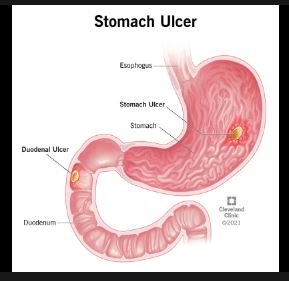
Stomach ulcers, also known as gastric ulcers, are sores that develop on the lining of the stomach. You can also get ulcers in part of the intestine just beyond the stomach, which are called duodenal ulcers.
Below are the 10 things you should know about stomach ulcer
1. Stomach ulcers are usually caused by Helicobacter pylori bacteria – a type of bacteria that infects your stomach.
2. The long-term use of Non-Steroidal Anti-Inflammatory Drugs can also lead to stomach ulcers. NSAIDs are medicines widely used to relieve pain, reduce inflammation and bring down high temperatures.
3. Some blood pressure medications, like spironolactone, can cause ulcers.
4. Other signs and symptoms of ulcers are weight loss, bloating, feeling easily full, pain that may improve when you eat, drink, or take antacids, shortness of breath, and vomit that’s bloody.
5. Untreated ulcers may cause bleeding and perforation of the stomach into the rest of the abdomen. The bleeding itself can be severe and immediately life-threatening if not quickly taken care of.
6. Eating a healthful diet can benefit your intestinal tract and overall health. It’s advisable to eat a diet with lots of fruits, vegetables, and fibre.
7. To prevent the spread of bacteria that might cause a stomach ulcer, endeavour to wash your hands with soap and water regularly. Also, ensure to properly clean all of your food and cook it thoroughly. Limit the use of NSAIDs.
8. You need to see a medical expert if you have any symptoms of a stomach ulcer. Even if your symptoms are mild, ulcers can worsen if they are not treated.
9. The treatment of stomach ulcers will depend on the cause(s). With treatment, most ulcers heal in a few months. In rare cases, a complicated stomach ulcer will require surgery.
10. There are no special lifestyle measures you need to take during treatment, but avoiding stress, alcohol, spicy foods, and smoking may lessen your symptoms.














